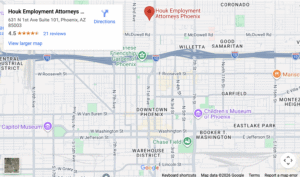
Marijuana is allowed for medical use in three U.S. territories, the District of Columbia, and 47 states, including Arizona. It is used for many medical conditions. Even so, marijuana continues to be illegal under federal law, even for medical purposes. Therefore, we must look to Arizona state law to determine how medical marijuana is treated in the workplace in Phoenix, AZ.
Unfortunately, the Arizona Medical Marijuana Act can confuse employers and workers. If you have a dispute related to medical marijuana in the workplace, you need an experienced employment attorney to analyze your situation and provide legal guidance. The legal team at Houk Employment Attorneys is here to help.
Contact us to schedule a consultation today at (480) 569-2377 with one of our Phoenix employment lawyers. We are available 24/7.
How Houk Employment Attorneys Can Help You With a Medical Marijuana Discrimination Case in Phoenix, Arizona

Determining whether an employer can terminate a worker for using medical marijuana in the workplace can be challenging. Understanding your legal rights and the law related to medical marijuana in the workplace is crucial.
Our employment attorneys at Houk Employment Attorneys have over 45 years of collective experience representing employees and businesses in employment matters. We help our clients navigate complex federal and state employment laws to protect their rights and best interests. Our attorneys have recovered millions of dollars for our clients in court and through settlement negotiations.
When you hire our award-winning Phoenix employment lawyers, you can trust we will:
- Analyze the factors related to your situation to determine the issues involved in your employment dispute
- Explain how Arizona medical marijuana laws apply to your situation
- Develop a strategy to resolve your dispute regarding medical marijuana in the workplace
- Determine if an employer’s policies or actions violated an employee’s rights or resulted in discrimination for medical marijuana use
- Negotiate a settlement agreement that is in your best interest and protects your rights
- Aggressively represent you during all court hearings and settlement negotiations
Our lawyers have recognition and awards from numerous national organizations, including Super Lawyers. We are members of prestigious employment law organizations, including the National Employment Lawyers Association, the Arizona Employment Lawyers Association, and the American Bar Association Labor and Employment Section.
Our clients are our top priority. If you have questions about medical marijuana in the workplace, call Houk Employment Attorneys to schedule a consultation with an experienced Phoenix employment lawyer.
What Is the Arizona Medical Marijuana Act?
The Arizona Medical Marijuana Act (AMMA) was passed in 2010. Qualifying individuals can obtain a medical marijuana registry card. The card allows the person to receive up to 2.5 ounces of marijuana every two weeks. In some cases, the law allows a person to cultivate up to 12 marijuana plans for their personal medical use.
Numerous diseases and health conditions qualify for medical marijuana use in Arizona, including, but not limited to:
- Epilepsy
- Multiple sclerosis
- Seizures
- Chronic and severe pain
- Glaucoma
- Cancer
- Hepatitis C
- Alzheimer’s disease
- Crohn’s disease
- Acquired Immune Deficiency Syndrome (AIDS)
- Human Immunodeficiency Virus (HIV)
- Amyotrophic Lateral Sclerosis (ALS)
The AMMA prohibits employers from discriminating against employees for medical marijuana use when they have a valid registry card. The law’s anti-discrimination provisions protect employees from being suspended, fired, or discriminated against for testing positive for marijuana metabolites.
However, the AMMA does not protect workers from being terminated if they used, possessed, or were impaired at work or during work hours. The presence of marijuana metabolites in an insufficient concentration to cause impairment does not demonstrate an employee was impaired during work hours.
What Do Employees and Employers Need to Know About Medical Marijuana in the Workplace and the Arizona Drug Testing of Employees Act?
The Arizona Drug Testing of Employees Act (DTEA) gives employers immunity from liability when they take an adverse action against an employee who:
- Tested positive for a drug test; or,
- Used, possessed, or was impaired by drugs or alcohol during work hours or while on company property.
The employer must have had a good faith belief that the employee was impaired based on a positive drug test. The immunity granted by the DTEA requires the employer to maintain a drug testing policy and program that complies with the law.
The DTEA and the AMMA appear to be in conflict. However, the court’s ruling in Whitmire v. Wal-Mart Stores Inc. helped reconcile the conflicting provisions in the two laws.
The court found that an employer cannot be used to fire an employee who has a valid registry card if:
- The employer’s action was based on a good-faith belief the employee was impaired by marijuana during work hours; and,
- The belief was based on a positive drug test that showed components or metabolites of marijuana in an amount sufficient to cause impairment.
Therefore, a positive drug test for marijuana by itself may be insufficient for terminating an employee or taking adverse actions. Without supporting evidence of sufficient marijuana in the employee’s system, an employer could face a workplace discrimination lawsuit for firing an employee who has a valid registry card because of a qualified debilitating medical condition.
Frequently Asked Questions About Medical Marijuana in the Workplace in Arizona
Employers and employees often have questions about their rights regarding medical marijuana in the workplace. Below are answers to FAQs about medical marijuana, drug testing, and anti-discrimination rights in Arizona.
Can an Employer Drug Test Their Employees for Marijuana Use?
The medical marijuana law in Arizona does not prohibit employers from creating a drug-free workplace. Employers can enforce drug-free workplace policies, including testing workers. The Arizona legislature passed A.R.S. §23-493 to define testing policy requirements.
Employers must follow the requirements in the law if they want to avoid being accused of discrimination for testing qualified medical marijuana users. The law requires employers to create and distribute written policies to every worker. The policies must clearly outline the company’s drug testing procedures.
Employers may be protected from legal action when they take adverse actions if they follow the statute’s requirements. If you were fired because of medical marijuana use, talk with a lawyer to determine if your employer followed the requirements for drug testing.
Can Employers Refuse to Hire Individuals With an Active Medical Marijuana Registry Card?
The AMMA protects medical marijuana users from discrimination.
The law states that an employer cannot discriminate against a person based on the person’s status as a cardholder by:
- Using the person’s status as a cardholder against them in making decisions regarding hiring or terminating employment
- Imposing negative conditions and terms of employment
- Penalizing a person solely based on their status
There is an exception for employers who would lose licensing or monetary benefits under federal law for hiring a medical marijuana user. However, the practical application of this exception does not impact many cases of AMMA violations.
Can an Employer Penalize an Employee For Testing Positive for Marijuana When They Are an Authorized Medical Marijuana User?
Generally, employers cannot penalize an employee for a positive drug test for marijuana when they are a valid medical marijuana user. The employer would need to prove that the employee used, possessed, or was impaired by marijuana during work hours. Evidence of impairment includes decreased coordination, bloodshot eyes, slurred speech, carelessness, detectable odor of marijuana, and negligence.
What Does Medical Marijuana Discrimination Include?
Discrimination against an authorized medical marijuana user occurs when an employer makes adverse employment decisions based on the employee’s use of medical marijuana.
Negative employment decisions and discrimination could include, but are not limited to:
- Wrongful termination
- Making derogatory jokes
- Denial of promotions
- Making offensive or harmful comments
- Refusal to give an employee career or job opportunities
- Demotions
- Reduction shifts, hours, or pay
- Employer retaliation
- Refusing to allow a worker to attend training
Proving discrimination for authorized medical marijuana use can be challenging. Keep copies of all documents and evidence of adverse employment actions. Talk with an employment lawyer as soon as possible to determine your options for filing employment discrimination claims.
Employment Issues Related to Medical Marijuana Use in the Workplace in Arizona
Employers and employees may encounter numerous legal matters related to medical marijuana in the workplace.
Examples of legal matters that our lawyers can help you address include, but are not limited to:
- Employment discrimination and harassment
- Confidentiality agreements
- Employment agreements and contracts
- Developing drug testing policies and procedures
- Wage and hour matters
- Consulting and independent contractor agreements
- Labor issues, including terminating employees and taking adverse employment actions
- Non-solicitation and non-compete agreements
- Driving employee handbooks and policies
- Developing procedures for hiring and terminating employees
If you have questions about medical marijuana in the workplace, the best way to protect your rights and interests is with the help of an experienced employment attorney. A labor law attorney can help you develop a plan for handling any legal matter related to medical marijuana use and employment.
Learn More About Medical Marijuana in the Workplace in Arizona
Employers can be responsible for damages if they discriminate because of medical marijuana. Call Houk Employment Attorneys to speak with a Phoenix employment attorney to learn more about your legal options if you face this situation.

